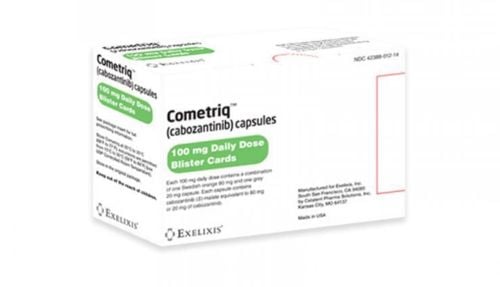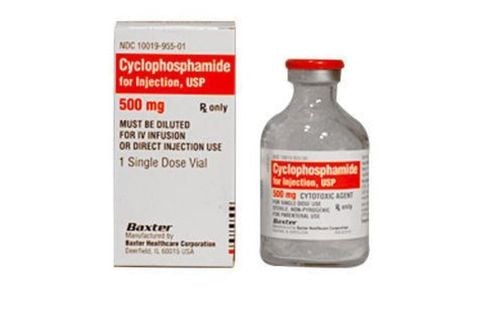This is an automatically translated article.
Cabazitaxel is used to treat cancer by inhibiting cell division and growth. The following article will introduce readers to this drug.1. What is Cabazitaxel?
Cabazitaxel is a drug that helps kill cancer cells by inhibiting cell division and growth. The drug works by inhibiting the growth and assembly of microtubules and other processes necessary for cell division.2. How to use Cabazitaxel
Cabazitaxel is given by intravenous infusion (IV) and the dose will be based on the patient's condition. Before use, patients will be prescribed a number of medications including antihistamines (Diphenhydramine), corticosteroids (Dexamethasone), and H2 blockers (Famotidine) to reduce some of the risk of reactions during the infusion. Translate. The concentration of drug distribution in the blood can be affected by some drugs such as: Ketoconazole, posaconazole, itraconazole, clarithromycin, voriconazole and some antiretroviral drugs used to treat HIV such as carbamazepine, phenytoin, phenobarbital , rifampin and St. John's wort. Therefore, patients need to report to their doctor all the medications they are taking.
3. Some possible side effects when using Cabazitaxel
Some common side effects that patients need to be aware of before using them include
Decreased white blood cell count (WBC) is very important to fight the body's infection response . During the course of the drug can cause a patient's white blood cell count to drop, putting them at higher risk of infection. Inform your doctor right away if you have a fever over 38°C, sore throat or cold, trouble breathing, cough, burning when urinating or persistent pain.
Anemia When the number of red blood cells is too low, the patient feels tired. Because these cells are responsible for carrying oxygen to the tissues in the body, when this happens the patient will feel short of breath or chest tightness. In case the number is too small, the patient can be given a blood transfusion.
Decrease in the number of platelets Platelets have the function of helping the clotting process to stop bleeding, so when the number is low, the patient is at risk of prolonged bleeding. When the body appears abnormal bruises or bleeding in places such as the nose, gums or blood in the stool or urine, it should be reported to the doctor immediately for appropriate treatment. Similar to blood transfusion, when the platelet count is low, the patient will be prescribed a platelet transfusion.
Diarrhea This is a common side effect of cancer drugs. To relieve this condition, patients can build a diet with low-fiber foods, not salty. Avoid eating raw fruits, vegetables, wholegrain breads, cereals, and seeds. Some forms of soluble fiber such as apple sauce, ripe bananas, boiled potatoes, canned fruit, orange parts, white rice, white flour products, cream of rice, oatmeal, cream of wheat and french fries. In addition, patients should pay attention to drink plenty of water to make up for the water lost due to diarrhea.
Fatigue This is a feeling that many patients often experience during cancer treatment. The condition usually does not go away despite getting plenty of rest. Patients need to schedule time or work to get enough rest and spend energy on more important activities.
Constipation Some measures to help relieve constipation that patients should consider applying such as eating more fiber in their daily diet with fruits and vegetables, drinking enough water every day and increasing moderate exercise with my own strength. Also, using a stool softener once or twice daily can prevent constipation.
In addition, there are some less common side effects including:
Allergic reactions: In some cases, patients may have an allergic reaction with manifestations such as rapid or difficult breathing, pain chest, rash, flushing or itching, tightness in the chest or throat, swelling in the face, dizziness or fainting. Therefore, during the infusion process, if there is any abnormality, it is necessary to immediately notify the medical staff for handling. Gastrointestinal bleeding: This drug may cause bleeding or perforation of the intestinal wall. Signs of these problems include: Unusual bleeding, bloody or black stools, coughing up blood, vomiting blood, vomit that looks like coffee grounds, fever, severe abdominal pain. Above is all the important information about Cabazitaxel. Knowing the use and dosage will help the process of using the drug more effectively.
Please dial HOTLINE for more information or register for an appointment HERE. Download MyVinmec app to make appointments faster and to manage your bookings easily.
Reference source: oncolink.org












